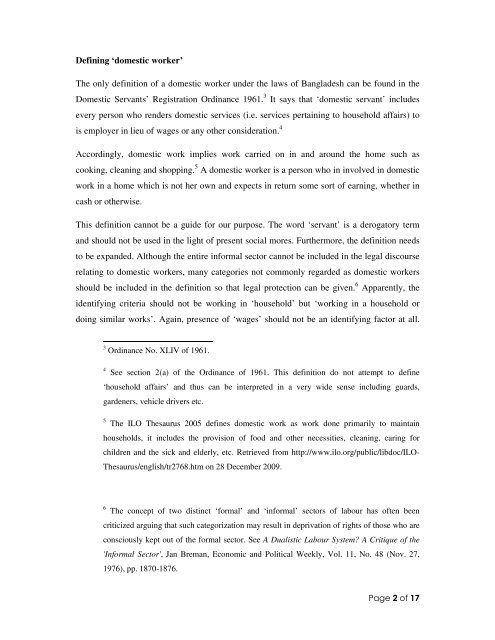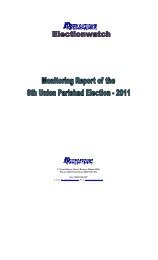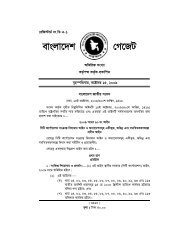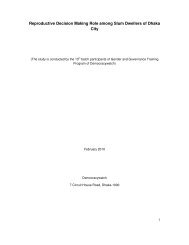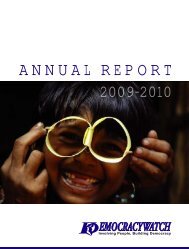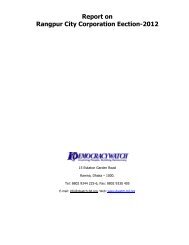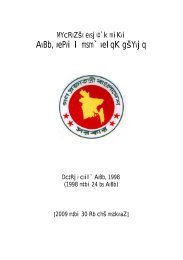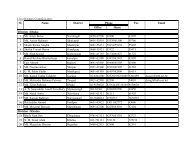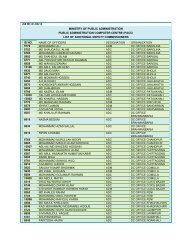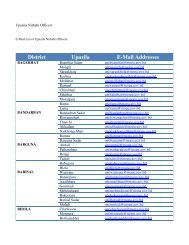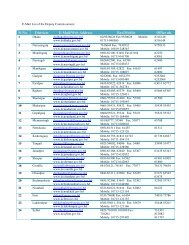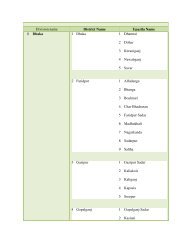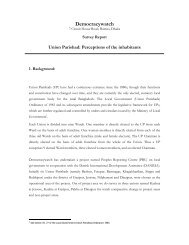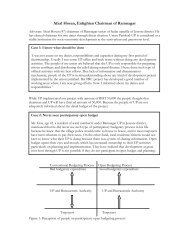Safeguarding the rights of domestic workers: Existing laws and ways ...
Safeguarding the rights of domestic workers: Existing laws and ways ...
Safeguarding the rights of domestic workers: Existing laws and ways ...
You also want an ePaper? Increase the reach of your titles
YUMPU automatically turns print PDFs into web optimized ePapers that Google loves.
Defining ‘<strong>domestic</strong> worker’<br />
The only definition <strong>of</strong> a <strong>domestic</strong> worker under <strong>the</strong> <strong>laws</strong> <strong>of</strong> Bangladesh can be found in <strong>the</strong><br />
Domestic Servants’ Registration Ordinance 1961. 3 It says that ‘<strong>domestic</strong> servant’ includes<br />
every person who renders <strong>domestic</strong> services (i.e. services pertaining to household affairs) to<br />
is employer in lieu <strong>of</strong> wages or any o<strong>the</strong>r consideration. 4<br />
Accordingly, <strong>domestic</strong> work implies work carried on in <strong>and</strong> around <strong>the</strong> home such as<br />
cooking, cleaning <strong>and</strong> shopping. 5 A <strong>domestic</strong> worker is a person who in involved in <strong>domestic</strong><br />
work in a home which is not her own <strong>and</strong> expects in return some sort <strong>of</strong> earning, whe<strong>the</strong>r in<br />
cash or o<strong>the</strong>rwise.<br />
This definition cannot be a guide for our purpose. The word ‘servant’ is a derogatory term<br />
<strong>and</strong> should not be used in <strong>the</strong> light <strong>of</strong> present social mores. Fur<strong>the</strong>rmore, <strong>the</strong> definition needs<br />
to be exp<strong>and</strong>ed. Although <strong>the</strong> entire informal sector cannot be included in <strong>the</strong> legal discourse<br />
relating to <strong>domestic</strong> <strong>workers</strong>, many categories not commonly regarded as <strong>domestic</strong> <strong>workers</strong><br />
should be included in <strong>the</strong> definition so that legal protection can be given. 6 Apparently, <strong>the</strong><br />
identifying criteria should not be working in ‘household’ but ‘working in a household or<br />
doing similar works’. Again, presence <strong>of</strong> ‘wages’ should not be an identifying factor at all.<br />
<br />
3 Ordinance No. XLIV <strong>of</strong> 1961.<br />
4 See section 2(a) <strong>of</strong> <strong>the</strong> Ordinance <strong>of</strong> 1961. This definition do not attempt to define<br />
‘household affairs’ <strong>and</strong> thus can be interpreted in a very wide sense including guards,<br />
gardeners, vehicle drivers etc.<br />
5 The ILO Thesaurus 2005 defines <strong>domestic</strong> work as work done primarily to maintain<br />
households, it includes <strong>the</strong> provision <strong>of</strong> food <strong>and</strong> o<strong>the</strong>r necessities, cleaning, caring for<br />
children <strong>and</strong> <strong>the</strong> sick <strong>and</strong> elderly, etc. Retrieved from http://www.ilo.org/public/libdoc/ILO-<br />
Thesaurus/english/tr2768.htm on 28 December 2009.<br />
6 The concept <strong>of</strong> two distinct ‘formal’ <strong>and</strong> ‘informal’ sectors <strong>of</strong> labour has <strong>of</strong>ten been<br />
criticized arguing that such categorization may result in deprivation <strong>of</strong> <strong>rights</strong> <strong>of</strong> those who are<br />
consciously kept out <strong>of</strong> <strong>the</strong> formal sector. See A Dualistic Labour System? A Critique <strong>of</strong> <strong>the</strong><br />
'Informal Sector', Jan Breman, Economic <strong>and</strong> Political Weekly, Vol. 11, No. 48 (Nov. 27,<br />
1976), pp. 1870-1876.


